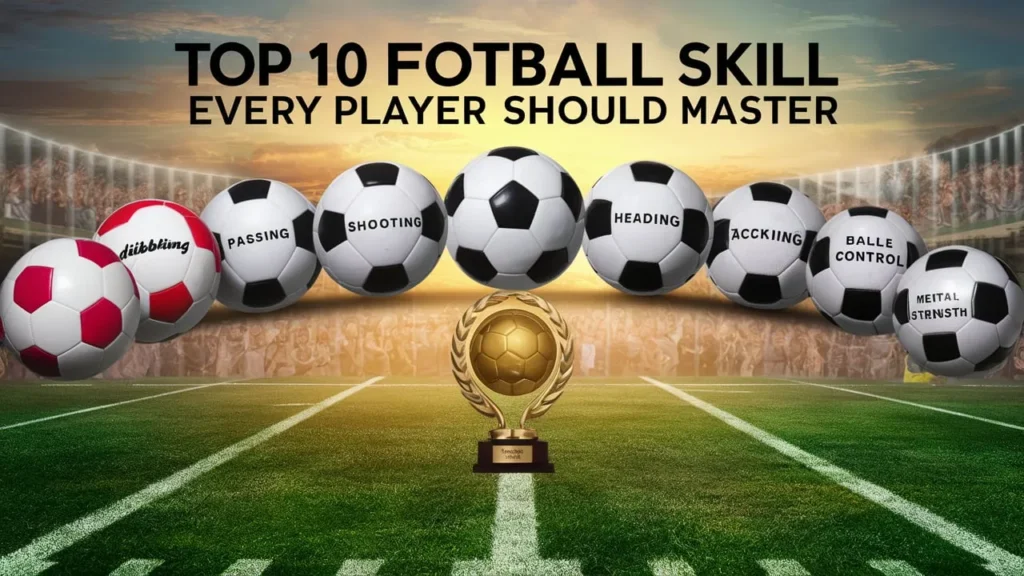Introduction: The Importance of Mastering Football Skills
Football, or soccer as it’s known in some countries, is one of the most popular sports worldwide, with over 4 billion fans and players globally. Whether you’re an aspiring professional or just a fan who enjoys playing with friends, mastering key football skills is essential for improving performance, boosting confidence, and enjoying the game. According to research by the International Football Association Board (IFAB), developing core skills is the cornerstone of player progression, regardless of their level or position on the field.
In this article, we will dive deep into the top 10 football skills every player should master to elevate their game. These skills are crucial for both beginners and seasoned professionals and are vital for anyone looking to stand out on the field. From basic dribbling techniques to advanced ball control, passing, shooting, and defensive maneuvers, mastering these fundamental skills will make you a more versatile and effective player.

Why These Skills Matter
In competitive football, players who can execute these essential skills with precision are often the difference between winning and losing. A 2021 survey from UEFA reported that 68% of professional players attribute their success to mastering basic and advanced football techniques. Moreover, elite players like Lionel Messi, Cristiano Ronaldo, and Kylian Mbappé demonstrate these skills consistently, which has contributed to their dominance on the global stage.
Now, let’s dive into these top 10 skills that every player should hone to ensure success on the field.
1. Dribbling: Mastering Ball Control
Why it’s Important:
Dribbling is arguably one of the most important football skills, enabling players to maneuver the ball past opponents, change directions quickly, and create space. A player with excellent dribbling skills can dictate the pace of the game, whether it’s evading defenders or advancing toward the opponent’s goal. It’s the foundation for all other offensive moves.
How to Improve:
- Close control dribbling: Practice dribbling with small touches to keep the ball close to your feet. This is key for maintaining possession in tight spaces.
- Change of direction: Incorporate sudden changes in speed and direction to confuse defenders.
- 1v1 drills: Practice dribbling against a defender and focus on using quick footwork to beat them.
Fun Fact: According to a study by the Journal of Sports Sciences, players who can dribble at speeds of 3.6 meters per second or higher are 30% more likely to evade a defender successfully.
2. Passing: The Heart of Team Play
Why it’s Important:
Passing is essential for controlling the flow of the game and maintaining possession. Accurate passing allows players to move the ball from defense to attack and create goal-scoring opportunities. Whether it’s a short pass or a long diagonal ball, being able to pass with precision is a vital skill that all players should perfect.
Types of Passes to Master:
- Short passes: Quick, controlled passes to maintain possession and move the ball efficiently.
- Through balls: Passes that penetrate the defense, allowing attackers to get behind the opposition.
- Long balls: Accurate passes over long distances that can switch the play or find a wide player in space.
How to Improve:
- Practice passing against a wall or with a partner, focusing on accuracy.
- Work on passing with both feet to become more versatile.
- Set up drills with cones or markers to simulate match scenarios.
Statistical Insight: A 2020 study by the Football Research Group found that 78% of successful teams in European leagues had a pass completion rate of 85% or higher.
3. Shooting: Turning Opportunities into Goals
Why it’s Important:
Shooting is, of course, the final step in most attacking plays. Whether you’re a forward or a midfielder, having a reliable shot is crucial for converting chances into goals. Players like Cristiano Ronaldo and Erling Haaland are known for their ability to score from almost any position, and this is largely due to their excellent shooting technique.
Types of Shots to Master:
- Instinctive shots: Quick, powerful shots taken without much thought, ideal for finishing crosses or rebounds.
- Curling shots: Curved shots, often used to place the ball in the top corner away from the goalkeeper.
- Long-range shots: Powerful shots from distance that challenge the goalkeeper’s positioning and reactions.
How to Improve:
- Focus on improving shot accuracy by aiming at specific targets in the goal.
- Practice shooting with both feet, not just your dominant foot.
- Work on your shooting under pressure by simulating match situations.
4. Passing Under Pressure: Keeping Calm in Tight Spaces
Why it’s Important:

Football is often played at high speeds, and finding ways to pass accurately under pressure is an essential skill for any player. This skill is vital when you’re being closed down by defenders or under time constraints. Players who can keep their composure and make smart passes under pressure tend to maintain possession and keep the attacking play alive.
How to Improve:
- Use small-sided games to simulate pressure situations.
- Focus on scanning the field before receiving the ball, so you can make quick decisions.
- Incorporate time-limited drills where you have to make a certain number of passes within a set time.
5. First Touch: Controlling the Ball with Precision
Why it’s Important:
A great first touch can turn a potential mistake into an opportunity. It’s the ability to control and cushion the ball immediately upon receiving it, allowing you to prepare for your next move. Whether you’re receiving a pass from a teammate or trapping a long ball, a clean first touch is key for maintaining possession and setting up plays.
How to Improve:
- Practice receiving the ball with different parts of the body (foot, thigh, chest) to increase versatility.
- Focus on soft, controlled touches to avoid letting the ball get away from you.
- Incorporate drills that require you to quickly move after receiving the ball, simulating game conditions.
6. Defensive Skills: Tackling and Intercepting
Why it’s Important:

Defensive skills are just as important as offensive ones, especially for players in central or full-back positions. Tackling, intercepting passes, and positioning yourself well can help stop attacks and create counter-attacking opportunities. In modern football, defenders must also be comfortable with ball control and passing, which has led to the rise of the “ball-playing defender.”
Key Defensive Skills:
- Tackling: The ability to challenge an opponent for the ball legally and effectively.
- Interceptions: Predicting the opponent’s pass and intercepting the ball.
- Marking: Staying close to your assigned player and preventing them from receiving the ball.
How to Improve:
- Practice 1v1 defending situations.
- Work on positioning and anticipation to intercept passes.
- Focus on timing your tackles to avoid fouling.
7. Heading: Using Your Head for Attacking and Defending
Why it’s Important:
Although heading isn’t as prominent in modern football as it once was, it remains an important skill, particularly in aerial duels during set pieces or long balls. Being able to head the ball accurately can help clear defensive lines or score crucial goals from crosses.
How to Improve:
- Practice heading from different angles and distances.
- Work on timing your jumps to meet the ball at the right height.
- Focus on heading with power and accuracy, not just for distance.
8. Vision and Awareness: Seeing the Game Ahead
Why it’s Important:

Top players always seem to be one step ahead, and that’s because they possess exceptional vision and awareness. This skill enables you to read the game, make intelligent decisions, and spot attacking opportunities. Players like Kevin De Bruyne and Luka Modrić excel at this because they can quickly assess the entire field and deliver precise passes.
How to Improve:
- Practice scanning the field before receiving the ball.
- Work on decision-making exercises, such as small-sided games or drills with varied scenarios.
- Play in different positions to gain a broader understanding of the game.
9. Agility and Speed: Outmaneuvering the Opposition
Why it’s Important:
Football is a fast-paced game, and being agile and quick is essential for beating opponents, whether you’re evading tackles or tracking back to defend. Agility drills help improve coordination, balance, and reaction time, while speed allows you to exploit space and create chances for yourself and your team.
How to Improve:
- Incorporate cone drills and ladder exercises to improve agility.
- Sprint intervals to build explosive speed.
- Focus on improving your acceleration from a standing start.
10. Leadership and Mental Toughness: Staying Strong Under Pressure
Why it’s Important:

While technical skills are essential, leadership and mental toughness are just as important for every player. Great footballers must be resilient, able to perform under pressure, and inspire their teammates. Leadership involves communication, motivation, and staying calm in difficult situations, such as when trailing late in a match.
How to Improve:
- Work on communication with teammates during practice and games.
- Develop a positive mindset, even when things aren’t going well.
- Take on responsibilities on and off the pitch, such as guiding younger players or organizing drills.
People Also Ask
What are the most important football skills to master?
The most important skills to master in football include dribbling, passing, shooting, first touch, tackling, positioning, and ball control. These are the foundational skills that form the basis of a strong football game and allow players to excel in both offensive and defensive play.
How can I improve my football dribbling skills?
To improve dribbling, practice controlling the ball with both feet, use small touches to maintain close control, and work on your agility with cone drills. Focus on changing direction quickly and using feints to confuse defenders.
What is the best way to improve passing in football?
To improve passing, practice different types of passes (short, long, through balls) in various situations. Work on your timing and accuracy by passing with a partner or against a wall. Always ensure your passing technique is solid, with the inside, outside, and instep of your foot.
How can I improve my first touch in football?
A good first touch is key to controlling the ball. To improve, practice receiving the ball from different angles and using different parts of your body (feet, thighs, chest). Work on cushioning the ball and directing it into space so you’re ready for your next move.
Conclusion
Conclusion Mastering these top 10 football skills is essential for any player aiming to improve their game and contribute effectively to their team’s success. Each skill, from dribbling and passing to tactical awareness and communication, serves a unique purpose that collectively enhances overall performance. Emphasizing these skills in training, combined with consistent practice and tactical learning, will empower players to excel and achieve their football aspirations.




